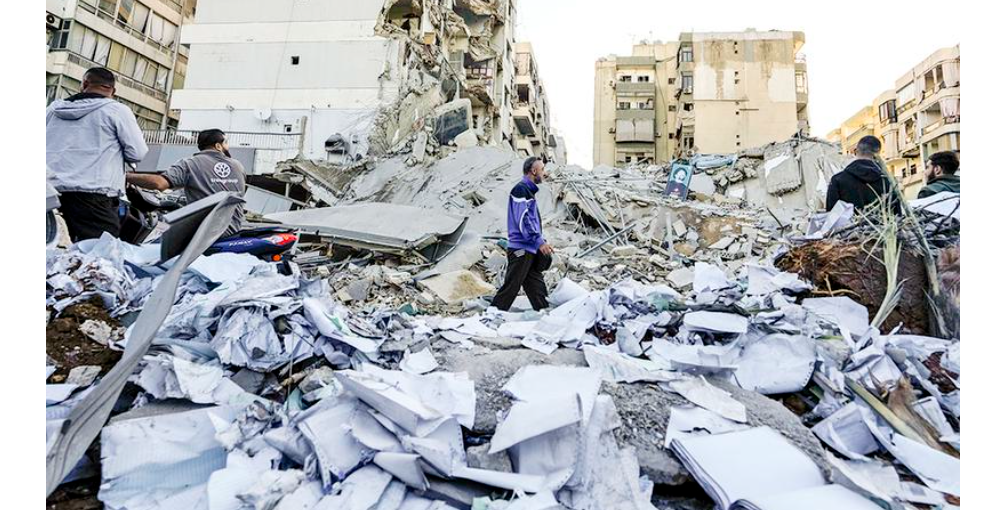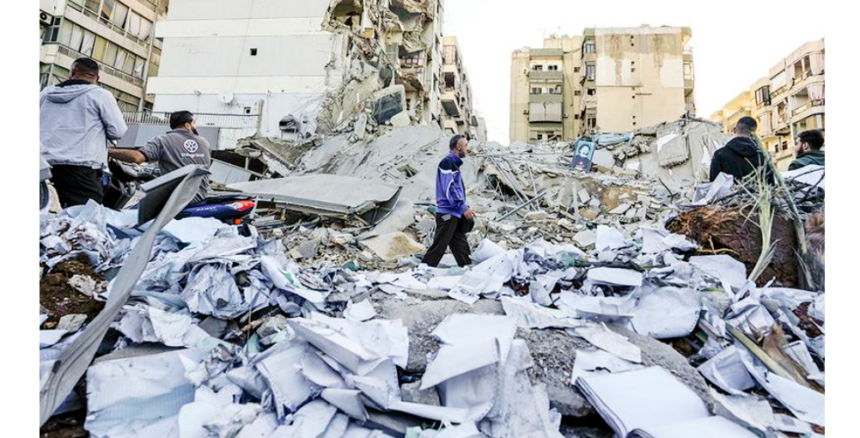In a dramatic escalation of hostilities in the region, Israeli forces carried out a series of airstrikes on an institution linked to Hezbollah, a group widely regarded as a terrorist organization by Israel and several Western nations. The targeted institution, al-Qard al-Hassan, is a financial firm that has been accused of providing financial support and micro-credit services to Hezbollah operatives. This attack, which took place in Beirut, marks a significant shift in Israel’s military strategy as it intensifies efforts to degrade Hezbollah’s operational capabilities amidst ongoing tensions.
The Context of the Airstrikes
The backdrop to this military action lies in the long-standing conflict between Israel and Hezbollah, which has persisted for decades. The two sides have been engaged in a cycle of violence, punctuated by clashes, skirmishes, and larger military confrontations. Hezbollah, an armed group based in Lebanon, was established in the early 1980s with the support of Iran and has become a significant player in Lebanese politics and regional conflicts. The organization is known for its military capabilities, including rocket attacks on Israeli territory, and its involvement in the Syrian civil war alongside Iranian forces.
In recent months, tensions have surged in the region due to the ongoing conflict between Israel and Hamas in Gaza. As Israel focuses its military efforts on combating Hamas, there are concerns that Hezbollah may take advantage of the situation to increase its own military activities against Israel. This has led to a heightened state of alert among Israeli military and intelligence agencies, with many believing that Hezbollah is preparing for a possible escalation of hostilities.
Al-Qard al-Hassan: A Financial Lifeline for Hezbollah
Al-Qard al-Hassan, the target of the recent airstrikes, is a financial institution that operates in Lebanon, providing micro-credit services to individuals and small businesses. Established in a country where the banking system has suffered severe collapse in recent years, this institution plays a crucial role in the local economy. However, it has also been accused of acting as a financial conduit for Hezbollah, enabling the group to fund its operations and activities.
The collapse of Lebanon’s banking system in 2019 led to widespread economic turmoil, leaving many citizens without access to traditional banking services. In this context, al-Qard al-Hassan emerged as a vital source of financial support, offering loans to individuals who might otherwise be unable to secure funding. Despite its function as a micro-finance institution, the organization has faced scrutiny due to its ties with Hezbollah and allegations that it facilitates the group’s financial dealings.
In the wake of the airstrikes, documents associated with al-Qard al-Hassan were scattered across the site of the attack, further highlighting the operation’s targeted nature. Israeli officials have claimed that this bombing is part of a broader strategy to disrupt Hezbollah’s financial networks, which are deemed essential for the group’s military operations. 
The Implications of the Strikes
The bombing of al-Qard al-Hassan is significant not only for its immediate impact but also for the broader implications it carries for the region. The airstrikes represent an expansion of Israel’s military operations beyond its borders, as it seeks to diminish Hezbollah’s capabilities and disrupt its operational infrastructure. By targeting financial institutions associated with Hezbollah, Israel aims to weaken the group’s ability to sustain its military activities and recruit new members.
This operation is also indicative of Israel’s increasing willingness to confront perceived threats in a more aggressive manner. The government of Prime Minister Benjamin Netanyahu has made it clear that it views Hezbollah as a critical threat to its national security, especially given the group’s close ties to Iran. As Israel continues to grapple with a complex regional landscape characterized by shifting alliances and increasing hostilities, such military actions may become more frequent.
However, the airstrikes also raise the potential for escalation in the region. Hezbollah, which has vowed to respond to any attacks on its infrastructure, could retaliate against Israel in various forms, including missile strikes or other military actions. Such a response could further destabilize the situation in Lebanon and lead to a broader conflict that could involve other regional players.
International Reactions
The international community has reacted with concern to the escalating violence between Israel and Hezbollah. Calls for restraint have emerged from various quarters, with many urging both sides to avoid actions that could lead to further conflict. The United Nations has expressed alarm over the potential humanitarian consequences of the ongoing violence, particularly in a region already grappling with economic hardships and a refugee crisis.
Meanwhile, Hezbollah has condemned the airstrikes as an act of aggression, framing them as part of Israel’s broader campaign against Lebanon and its people. In statements following the bombing, Hezbollah vowed to continue its resistance against Israeli forces and reaffirmed its commitment to defending Lebanon against external threats. This rhetoric resonates with many in Lebanon, where there is a strong sense of national identity and solidarity against perceived Israeli aggression.
The Broader Regional Context
The airstrikes on al-Qard al-Hassan occur within a broader regional context marked by complex dynamics involving Iran, Syria, and various militant groups. Iran has been a key supporter of Hezbollah, providing funding, training, and military support. This relationship complicates the situation for Israel, which views Iran’s influence in the region as a direct threat to its security.
As tensions between Israel and Hezbollah escalate, other regional players, including the United States and Gulf Arab states, are closely monitoring the situation. The U.S. has maintained a strong alliance with Israel and has expressed its commitment to countering Iranian influence in the region. However, the complexities of the conflict make it challenging for outside powers to navigate the situation without exacerbating existing tensions. 
The Humanitarian Impact
Amidst the military actions and political maneuvering, the humanitarian impact of the ongoing conflict cannot be overlooked. The bombing of al-Qard al-Hassan, while a targeted military action, has direct consequences for the Lebanese population. The collapse of the financial system has already left many struggling to make ends meet, and further disruptions to financial services can exacerbate the dire economic situation.
For ordinary citizens, the repercussions of military actions are often felt most acutely. Many families rely on institutions like al-Qard al-Hassan for basic financial support, and the destruction of such services can push vulnerable populations further into poverty. The ongoing violence also creates an atmosphere of fear and uncertainty, making it difficult for communities to plan for the future or rebuild their lives.
Conclusion: A Dangerous Escalation
The bombing of al-Qard al-Hassan represents a significant escalation in Israel’s military campaign against Hezbollah and highlights the complex interplay of military, political, and economic factors shaping the conflict in the region. As both sides brace for potential retaliation and further hostilities, the situation remains fluid and precarious.
The conflict between Israel and Hezbollah is far from resolved, and the recent airstrikes may only serve to intensify the cycle of violence. The international community faces a pressing challenge in seeking to de-escalate tensions and address the underlying issues that contribute to this enduring conflict. Ultimately, the fate of institutions like al-Qard al-Hassan and the people they serve may hang in the balance as the region continues to grapple with the consequences of war and instability.
As we reflect on the events unfolding in Lebanon and Israel, it is crucial to remember that behind the headlines and military actions lie real lives affected by conflict. The bombing of al-Qard al-Hassan is not just a strategic military operation; it is a stark reminder of the human cost of war and the urgent need for dialogue, reconciliation, and sustainable peace in a region torn apart by violence. ALSO READ:-Abhishek Powers India-A to a Thumping Win Over UAE: A Star Performance in a Dominant Victory 2024





